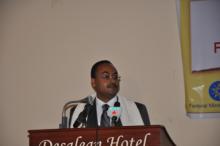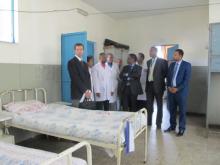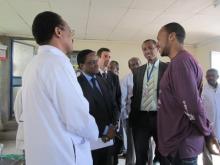There is No Health without Mental Health - Reforming Mental Health Services in Ethiopia
Ethiopia holds first National Mental Health Symposium
Ethiopia’s first National Mental Health Symposium was held in Addis Ababa, 11-12 August 2014. The two-day symposium organized by the Federal Ministry of Health gathered together mental health professionals, religious leaders, representatives of international organizations and other experts to discuss effective strategies to address mental health in Ethiopia. The Symposium called for the reforming of mental health services in Ethiopia concluding that the scale-up and integration of mental health into the health system will require the engagement of all stakeholders.
“Improved access to primary health care provides an excellent opportunity to also improve mental health services,” Dr Kesetebirhan Admasu, Minister of Health, stressed at the opening of the Symposium. He said that mental health is integrated into the Health Extension Programme, which enables all health extension workers with a basic understanding of mental health. The Minister of Health also appointed Ato Abebe Balcha, a renowned Ethiopian artist and lawyer, as the country’s Goodwill Ambassador for Mental Health to raise awareness on mental health and to reduce stigma and discrimination against those affected.
“The National Mental Health Symposium testifies the commitment and endeavor of the Ministry in addressing mental health needs of the Ethiopian people,” said Dr Pierre M’Pele-Kilebou, WHO Representative to Ethiopia, and highlighted that mental health is a core element of the definition of good health. Dr Peter Salama, UNICEF Representative confirmed on behalf of the Health Development Partners’ Network the support of partners to address mental health challenges in Ethiopia.
The health development partners came together in a side event hosted by Dr Amir Aman, State Minister of Health, on 11 August to mobilize support for the scale-up of mental health care in Ethiopia. Eleven per cent of the total burden of disease in Ethiopia can be attributed to mental health disorders. People suffering from mental illness are often the most marginalized, and affected by stigma and discrimination. The participants learned that Ethiopia’s scale-up plan of integrated mental health care will add value to existing programmes to improve health and development in the country.
WHO, in collaboration and support of the European Union and Foundation d’Harcourt, has been supporting the FMoH to scale-up mental health services and successfully implement the WHO Mental Health Gap Action Programme (mhGAP) in selected sites over the past three years. Dr M’Pele-Kilebou assured at the Symposium that WHO will continue to collaborate with FMoH to reach the target of 800 health facilities, as assigned by FMoH, with mhGAP training from the current 150, as well as conduct training of trainers on all aspects of mental health in humanitarian emergencies by the end of 2014.
According to Dr Shekhar Saxena, Director of the Department of Mental Health and Substance Abuse of the World Health Organization, Ethiopia’s experience of implementing WHO’s Comprehensive Mental Health Action Plan 2013-2020 will serve as a good example for the African region and indeed for the entire world. He assured continued technical assistance of WHO to the scaling up of mental health services in Ethiopia.
The WHO Representative to Ethiopia also visited Amanuel Specialized Mental Hospital, in Addis Ababa, on 21 August, to reconfirm WHO’s support to the hospital. Amanuel is one of the oldest hospitals in the country and WHO has been supporting it since 1986, through the training of psychiatric nurses. The WHO delegation was welcomed by Dr Dawit Assefa, CEO of the hospital and a team of staff, including psychiatrists, nurses and other hospital employees, who acknowledged this good and long-lasting partnership with WHO in the domain of mental health. The WHO Representative assured that WHO will intensify its support to the overall programme in mental health in Ethiopia and more specifically to Amanuel Hospital.
For more information, please contact: Dr Andrea Bruni, Mental Health, WHO Ethiopia; Email: brunia [at] who.int (brunia[at]who[dot]int)
PHOTOS: WHO Ethiopia/ Viivi Erkkila & Mihret Abeselom









